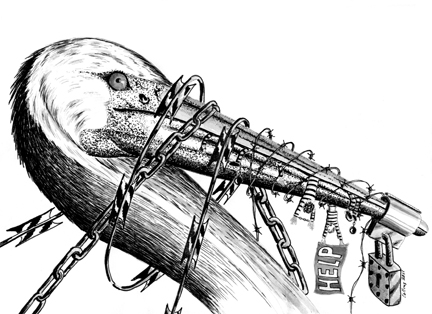|
NEWS & LETTERS, September-October 2011
Hunger striker speaks
July 4, 2011
Pelican Bay, Calif.--Here in Pelican Bay State Prison's Security Housing Unit (SHU), a number of us prisoners decided to launch a peaceful collective protest in the form of a hunger strike starting July 1. This action is necessary due to the anti-human, draconian institutional policies implemented by the California Department of Corrections and Rehabilitation (CDCR).
According to those policies, our confinement and length of time in SHU are by no stretch of the imagination an extralegal death sentence. The use of the term "extralegal" is quite correct. The court ruling that established the active/inactive gang status review has amounted to a comic process that clearly undermines its original judicial intent. It was supposed to be an impartial review of a prisoner's past and present institutional behavior in determining his alleged gang status. It has turned into a re-designation of gang status.
Since the Institutional Gang Investigators cannot find any criminal activity in furthering the objectives of a gang, they use a boiler-plate term, such as "a threat to inmates, staff, and institutional security." It is their way of maintaining their forced interrogation policy: one has to debrief (snitch) or die in the SHU.

Image by Pete Collins, imprisoned at Bath Prison, Ontario, Canada, in solidarity with the Pelican Bay strikers.
It is this issue, more than any other, that has galvanized the overwhelming support of us prisoners. The hunger strike is intended to bring about a process where we are judged impartially and on an individual basis to determine alleged gang status, one that affords us a real opportunity of being released from the SHU to fully participate in whatever rehabilitation programs are still available to California prisoners.
We are not asking for anything special in our treatment, only the due process of law that has been enshrined in the U.S. Constitution. What the hunger strike is about, in essence, is a fundamental plea that our humanity and dignity as men be respected.
* * *
July 26, 2011
On July 22 the local Channel 3 News reported that the prisoners had declared the hunger strike a victory. The claim of victory rests upon the prisoncrats' alleged acquiescence to the small, very basic prisoners' demands. For example, now SHU prisoners will be allowed watch caps and more educational opportunities.
I don't discount or minimize these small gains, because they lessen the degree of the overall torturous effects of being perpetually subjected to SHU confinement. Nonetheless the question remains what prisoners--if any at all--actually declared such gains as victory? It's clear the media wasn't given access to the representatives of the hunger strike, where one-on-one interviews would reveal prisoners' true sentiments about the strike and its conclusion. Without this particular input directly out of the mouths of prisoners, any kind of assessment of the hunger strike is one-sided.
A day or so before, prisoncrats released a statement characterizing the prisoners' participation in the strike as misguided. They said that after a meeting with prisoners, in which CDCR articulated their projected strategic plan for next year, understanding and acceptance materialized as prisoners realized that CDCR was already moving to address their vital concerns. Nothing could be further from the truth.
However, that action by CDCR is the unintended recognition of the success of the hunger strike. The force of the strike, its large internal participation and its widespread external support, caught CDCR off guard as it went beyond their ability to control. The strike broke through the veil of vulgar deception that has continuously served CDCR in misleading the public.
Now, perhaps, the veil has been lifted and rays of light shine on present-day prison operations and the policies governing SHU confinement. It isn't a secret to prisoners or their loved ones that for decades CDCR hasn't had a handle on administering internal prison policies that are humane and that return prisoners to the community at large as wholesome, productive individuals. The basis for the hunger strike, in its most simple and undeniable interpretation, was to turn prisons toward such social functions. How can it be said prisoners are misguided?
The ultimate success or failure of the strike will be shaped by individual's perspective. The most important thing now is to not lose sight of the positive in the negative as we search for a way to begin anew. Prisoners reach for the level of social conditions behind prison walls that give us the ability to express our humanity in opposition to the oppressive prison conditions. It is no different from the efforts in various countries today trying to lift the curse of capitalist social relations.
At the heart of social movements is the fundamental quest to unify subjectivity and objectivity--in other words, for an individual's thinking/feelings to be reflected in their given reality. With such a full expression of humanism, society can be reconstructed on human foundations.
--Faruq
|

